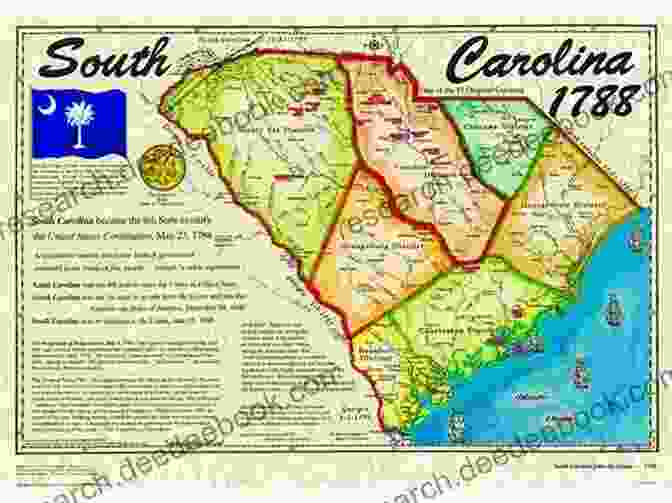Humble Beginnings: The Foundation of South Carolina
The story of Modern South Carolina begins in the mid-17th century with the arrival of European settlers along the Carolina coast. Initially established as a haven for religious freedom, the colony quickly pivoted towards agricultural production, primarily cultivating rice and indigo. These lucrative crops laid the foundation for the colony's economy, which flourished under the labor of both European indentured servants and enslaved Africans. The establishment of the Port of Charleston, known as the "Rice City," served as a vital gateway for international trade and further propelled the colony's development.

Civil War and Reconstruction: A Tumultuous Period
South Carolina played a pivotal role in the American Civil War, becoming one of the first states to secede from the Union in 1860. The state's deep economic dependence on slavery and the election of Abraham Lincoln, who opposed its expansion, fueled the secessionist sentiment. The war brought devastation to the state, resulting in the destruction of its infrastructure and the emancipation of its enslaved population. Reconstruction, the period following the war, was marked by significant social and political changes, including the enfranchisement of African Americans and the establishment of public education systems. However, this progress was met with resistance and eventually gave way to the rise of Jim Crow laws and a period of segregation and racial violence.

From Jim Crow to the Civil Rights Movement
The 20th century brought both challenges and progress to South Carolina. The state's economy continued to rely heavily on agriculture, but the Great Depression and boll weevil infestation severely impacted its farming communities. Industrialization also began to take hold, particularly in textile manufacturing, which provided new employment opportunities. The Civil Rights Movement of the 1950s and 1960s gained momentum in South Carolina, led by activists such as Septima Poinsette Clark and Modjeska Monteith Simkins. Their efforts challenged racial segregation and discrimination, leading to the desegregation of public facilities and the Voting Rights Act of 1965, which restored voting rights to African Americans.

The Rise of Tourism and Economic Diversification
In the post-Civil Rights era, South Carolina experienced significant economic diversification. The state's mild climate and coastal beauty attracted a growing number of tourists, and tourism became a major industry. The development of industries such as manufacturing, technology, and financial services further expanded the state's economic base. The establishment of BMW's manufacturing plant in 1992 was a major boost to the economy and helped attract other businesses to the region. South Carolina also invested in higher education and research, establishing world-renowned institutions such as the University of South Carolina, Clemson University, and the Medical University of South Carolina.

Modern South Carolina: A Vibrant and Progressive State
Today, South Carolina stands as a vibrant and progressive state, with a diverse and growing population. Its economy continues to expand, fueled by innovation, education, and international trade. The state is home to major cities such as Columbia, Charleston, Greenville, and Myrtle Beach, each with its unique charm and cultural offerings. South Carolina is also recognized for its rich cultural heritage, including a vibrant African American, Gullah, and Lowcountry culture. It boasts beautiful beaches, stunning landscapes, and a plethora of outdoor recreation opportunities. The state has made significant strides in social justice, healthcare, and education, creating a welcoming and inclusive environment for all its residents.

<> The journey of Modern South Carolina has been marked by resilience, transformation, and progress. From its humble beginnings as an agricultural colony to its present-day status as a thriving economic and cultural hub, the state has evolved in remarkable ways. Through its rich history, social struggles, and economic triumphs, South Carolina has forged a resilient spirit and a unique identity that sets it apart. Today, the state stands as a beacon of hope and opportunity, offering its residents a high quality of life, a vibrant cultural scene, and a promising future. As South Carolina continues to embrace innovation and inclusivity, it is poised to shape its destiny and contribute to the ever-evolving tapestry of American history.




























































































